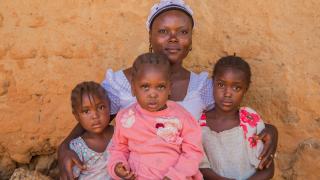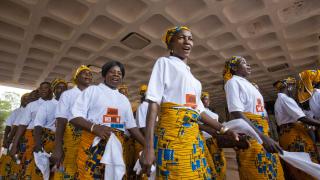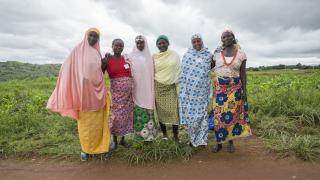UK Government decisions to cut UK Aid are disproportionately falling on women and girls
In May 2021, the UK Government announced that it was making substantial cuts to UK Aid. This included cuts to Women for Women International’s own programming in Afghanistan and Nigeria.
Since then, we have been working with others to raise awareness of the impact of the cuts, promote transparency and hold the UK Government accountable.
This included feeding into sector-wide rapid assessments of the gendered impact of the cuts, including this briefing led by CARE International, by contributing our own analysis and two case studies from our programmes that had been cut. This was shared with UK Parliamentarians ahead of an emergency debate on the cuts, and with the media to raise awareness of the impact of these decisions, with a view to seeking a commitment from the UK Government to increase the aid budget as soon as possible.
As we noted in the joint-briefing:
“UK Aid cuts, and the way they are being implemented, will have wide-ranging and long-standing impacts on the world’s poorest people – in particular, women and girls. Analysis of estimated funding between 2019 and 2022 compared to 2015 to 2018, indicates that gender equality focused programming is being severely affected, and women and girls will suffer most from reductions in funding to critical sectors. This will result in an estimated 20 million women and girls who won’t be reached by programming.”
The two case studies that we included in the briefing discuss women’s social and economic empowerment. The programme which was cut in Nigeria planned to bring together 3,600 women displaced by violence and conflict with women from host communities in Bauchi State, Nigeria. These women were to learn about their rights, health, and wellbeing and develop vocational and business skills to improve their livelihoods and increase leadership roles through our 12-month Stronger Women, Stronger Nations programme.
Despite strong programme results in the first 19 months of a planned 36, it has been cut with immediate effect. This will mean the second cohort of women will not have chance to complete the programme they are over halfway through, and the third cohort of 1,200 women will not get the chance to start the programme.
One participant who was able to complete her training during the first year of this project said:
All the promises made by our trainers before I was enrolled into the programme were fulfilled. We were given back our confidence through the training on rights.
She continued:
"We were taught business and vocational skills to start and manage a profitable business. At the start of the programme, I had no means of earning an income. We learned how to form support networks and now we all have individual bank accounts - something I would never have thought of while living my old life."
The impact of the cuts to the programme in Bauchi received media attention via an article in The Guardian and Devex with commentary from the Women for Women International - Nigeria Country Director Bukola Onyishi. Read these articles and Women for Women International's official statement on the UK aid cuts to learn more.
Keep Reading
Briefing: UK Government decisions to cut UK Aid are disproportionately falling on women and girls
subtitle:
Women for Women International fed into this joint-briefing, led by CARE International, contributing our own analysis and two case studies from our programmes that had been cut.
18 JULY 2021 | THE GUARDIAN
Buki Onyishi, Country Director of our Nigeria programme talks to The Guardian about foreign funding cuts that threaten the future of women and girls and have a long-term impact on gender equality.
20 MAY 2021 | DEVEX
Buki Onyishi, Country Director of our Nigeria programme writes for Devex.
"I challenge someone to tell me the value for money that is represented by ending a program halfway through."



